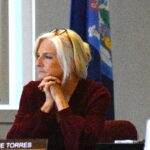CARIBOU, Maine — Caribou City Council approved an emergency ordinance that would alter the city’s emergency leave policies in light of the COVID-19 pandemic.
The ordinance is in accordance with the Families First Coronavirus Response Act, signed by President Donald Trump on March 18.
The emergency ordinance will be in effect for the next 61 days after the council adopted it during its April 6 meeting, which involved officials communicating via the Zoom app in order to comply with social distancing measures.
The city council had decided in March to table discussion on a specific ordinance until it could reach out to the Maine Municipal Association’s legal team and other towns in order to determine the best course of action.
All municipalities in the country need to follow the new law’s guidelines as a minimum, but may choose to provide additional benefits.
Since that meeting, Caribou City Manager Dennis Marker told the council he has had multiple phone conferences with the association and its legal counsel, as well as communities throughout the state and in Aroostook County.
The new iteration of the city’s policy contains changes based on those conversations. Marker said the association has not provided a template for municipalities, but in general advised cities and towns to provide employees with more flexibility during this time.
The city’s new policy will allow employees working as usual to continue receiving their regular pay. The city manager would need to review any requests to work remotely or from home, at which point they would accomplish pre-authorized remote work projects.
Employees who want to stay home out of concern for exposure, but who are not currently infected or posing a risk to anyone at their home, would need to use vacation or compensation time to cover that absence.
Any city workers who are cleared to work from home, including those who have the coronavirus, are at an increased risk, or who need to care for children who would otherwise be in school, will be given work to take care of at home. If their current job duties don’t include anything that can be taken care of at home, the city can reassign other projects or tasks to those employees and continue to pay them their regular wages.
Public safety workers or emergency service responders in quarantine due to potential exposure to the coronavirus will be given administrative leave, or additional paid time away, for a period of two weeks or until they can show test results indicating that they are not infected, whichever is sooner.
“We depend on public safety personnel and first responders, and we want to get them back on board as soon as we can,” Marker said. “We want to make sure they’re protected and not infecting their family and coworkers.”
Seemingly healthy employees directed to leave work or be quarantined and who cannot work remotely would still be compensated for up to two weeks of work during this time.
Any employees who are out of work due to illness, but not specifically COVID-19, would follow the city’s regular guidelines concerning sick leave, and need to provide a doctor’s note if they’re sick for an extended period. Anyone with a family member infected with the virus would need to stay home until they’re tested.
Marker explained to the council that while the new ordinance can be adopted immediately, councilors can continue to make refinements.
Councilor Doug Morrell asked how the city would manage people working from home. Marker explained that employees will be given specific projects to complete while working from home.
He cited how the library has two at-risk employees working from home and how Children’s Librarian Erin Albers is recording videos of herself reading books and publishing them online, because area children cannot attend her reading events in person.
Morrell said that, in the business world, every job is based on a certain amount of time employees are given to work, and that this could lead to a gray area in terms of managing and measuring work done by city employees.
“Every assignment that goes out has a deadline attached,” said Marker. “You have to show the performance that you’re doing with these things on a weekly basis. Erin Albers is preparing videos, and we know that preparing those videos takes so many minutes or hours of time.”
Mayor Mark Goughan asked Marker if he knows how any surrounding communities have adopted these policies. The city manager said Dover-Foxcroft, for example, added an element to the policy that would allow employees to use half of their administrative leave in addition to half of their sick leave if they were not sick but wanted to stay home as a preventative measure.
Goughan and Marker reiterated that city officials across the country are still trying to reach a full understanding of the new policy.
The mayor said he was concerned that the federal policy could change a week from their meeting, and that employees may receive more benefits via future changes to the federal law if the city just adopts the federal policy as a default.
“If the federal government provides a greater benefit, we have to provide that; we can’t provide less than what they require,” Marker said.
Marker also explained that while federal guidelines under the Family and Medical Leave Act would require employees to receive two thirds of their normal pay while out, the city’s version of the ordinance would allow them to utilize a portion of their paid sick time to receive full pay while away from work.
All councilors voted in favor of the ordinance while Mayor Mark Goughan voted against it.








